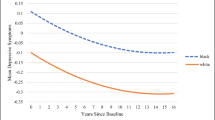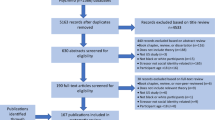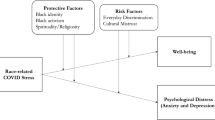Abstract
Experiencing growth after the diagnosis of a life threatening illness is commonly reported among people living with HIV (PLWH). The links between benefit finding and better adjustment in PLWH have been identified, but it is less clear whether these links vary by ethnicity. Minority stress theory suggests that individuals from minority populations may have unique stress experiences, which can have negative health implications but may also provide opportunity for growth. We hypothesized that the association between benefit finding and psychological adjustment would be stronger for Black (n = 80) than White (n = 87) PLWH. Contrary to predictions, the relationship between benefit finding and better adjustment was significant for White but not Black PLWH. Post-hoc analyses suggested that sexual orientation played role in this relationship. The relationship between benefit finding and psychological adjustment may be complex for Black PLWH, or they may achieve adjustment using other resources.
Similar content being viewed by others
References
Aranda-Naranjo, B. (2004). Quality of life in the HIV-positive patient: Implications and consequences. JANAC: Journal of the Association of Nurses in AIDS Care, 15, 20S–27S. doi:10.1177/1055329004269183
Bekele, T., Rourke, S. B., Tucker, R., Greene, S., Sobota, M., Koornstra, J., et al. (2013). Direct and indirect effects of perceived social support on health-related quality of life in persons living with HIV/AIDS. AIDS Care, 25, 337–346. doi:10.1080/09540121.2012.701716
Blume, J., Douglas, S. D., & Evans, D. L. (2011). Immune suppression and immune activation in depression. Brain, Behavior, and Immunity, 25, 221–229. doi:10.1016/j.bbi.2010.10.008
Bogart, L. M., Landrine, H., Galvan, F. H., Wagner, G. J., & Klein, D. J. (2013). Perceived discrimination and physical health among HIV-positive Black and Latino men who have sex with men. AIDS and Behavior, 17, 1431–1441. doi:10.1007/s10461-012-0397-5
Bower, J. E., Kemeny, M. E., Taylor, S. E., & Fahey, J. L. (1998). Cognitive processing, discovery of meaning, CD4 decline, and AIDS-related mortality among bereaved HIV-seropositive men. Journal of Consulting and Clinical Psychology, 66, 979–986.
Braxton, N. D., Lang, D. L., Sales, J. M., Wingood, G. M., & DiClemente, R. J. (2007). The role of spirituality in sustaining the psychological well-being of HIV-positive black women. Women and Health, 46, 113–129.
Brener, L., Wilson, H., Slavin, S., & de Wit, J. (2013). The impact of living with HIV: Differences in experiences of stigma for heterosexual and homosexual people living with HIV in Australia. Sexual Health, 10, 316–319.
Cargill, V. A., & Stone, V. E. (2005). HIV/AIDS: A minority health issue. The Medical Clinics of North America, 89, 895–912.
Carrico, A. W., Ironson, G., Antoni, M. H., Lechner, S. C., Durán, R. E., Kumar, M., et al. (2006). A path model of the effects of spirituality on depressive symptoms and 24-hurinary-free cortisol in HIV-positive persons. Journal of Psychosomatic Research, 61(1), 51–58.
Carrico, A. W., Riley, E. D., Johnson, M. O., Charlebois, E. D., Neilands, T. B., Remien, R. H., et al. (2011). Psychiatric risk factors for HIV disease progression: The role of inconsistent patterns of antiretroviral therapy utilization. JAIDS: Journal of Acquired Immune Deficiency Syndromes, 56, 146–150.
Catz, S. L., Gore-Felton, C., & McClure, J. B. (2002). Psychological distress among minority and low-income women living with HIV. Behavioral Medicine, 28, 53.
Coleman, C. L., & Holzemer, W. L. (1999). Spirituality, psychological well-being, and HIV symptoms for African Americans living with HIV disease. Journal of the Association of Nurses in AIDS Care, 10, 42–50.
Costa, R. V., & Pakenham, K. I. (2012). Associations between benefit finding and adjustment outcomes in thyroid cancer. Psycho-Oncology, 21, 737–744. doi:10.1002/pon.1960
Cruess, D. G., Douglas, S. D., Petitto, J. M., Have, T. T., Gettes, D., Dubé, B., et al. (2005). Association of resolution of major depression with increased natural killer cell activity among HIV-seropositive women. The American Journal of Psychiatry, 162, 2125–2130. doi:10.1176/appi.ajp.162.11.2125
Danoff-Burg, S., & Revenson, T. A. (2005). Benefit-finding among patients with rheumatoid arthritis: Positive effects on interpersonal relationships. Journal of Behavioral Medicine, 28, 91–103.
Dowshen, N., Binns, H. J., & Garofalo, R. (2009). Experiences of HIV-related stigma among young men who have sex with men. AIDS Patient Care and STDs, 23, 371–376.
Dunbar, H. T., Mueller, C. W., Medina, C., & Wolf, T. (1998). Psychological and spiritual growth in women living with HIV. Social Work, 43, 144–154.
Gonzalez, J. S., Batchelder, A. W., Psaros, C., & Safren, S. A. (2011). Depression and HIV/AIDS treatment nonadherence: A review and meta-analysis. Journal of Acquired Immune Deficiency Syndromes, 58, 181–187. doi:10.1097/QAI.0b013e31822d490a
Grös, D. F., Antony, M. M., Simms, L. J., & McCabe, R. E. (2007). Psychometric properties of the State-Trait Inventory for Cognitive and Somatic Anxiety (STICSA): Comparison to the State-Trait Anxiety Inventory (STAI). Psychological Assessment, 19, 369–381.
Hayes, A. F. (2013). Introduction to mediation, moderation, and conditional process analysis: A regression-based approach. New York: Guilford Press.
Helgeson, V. S., Reynolds, K. A., & Tomich, P. L. (2006). A meta-analytic review of benefit finding and growth. Journal of Consulting and Clinical Psychology, 74, 797–816.
Hughes, D., Rodriguez, J., Smith, E. P., Johnson, D. J., Stevenson, H. C., & Spicer, P. (2006). Parents’ ethnic-racial socialization practices: A review of research and directions for future study. Developmental Psychology, 42, 747.
Kalichman, S. C., DiMarco, M., Austin, J., Luke, W., & DiFonzo, K. (2003). Stress, social support, and HIV-status disclosure to family and friends among HIV-positive men and women. Journal of Behavioral Medicine, 26, 315.
Lechner, S. C., Tennen, H., & Affleck, G. (2009). Benefit-finding and growth. In S. J. Lopez, C. R. Snyder, S. J. Lopez, & C. R. Snyder (Eds.), Oxford handbook of positive psychology (2nd ed., pp. 633–640). New York, NY: Oxford University Press.
Leserman, J. (2008). Role of depression, stress, and trauma in HIV disease progression. Psychosomatic Medicine, 70, 539–545.
Littlewood, R. A., Vanable, P. A., Carey, M. P., & Blair, D. C. (2008). The association of benefit finding to psychosocial and health behavior adaptation among HIV+ men and women. Journal of Behavioral Medicine, 31, 145–155.
Luszczynska, A., Sarkar, Y., & Knoll, N. (2007). Received social support, self-efficacy, and finding benefits in disease as predictors of physical functioning and adherence to antiretroviral therapy. Patient Education and Counseling, 66, 37–42.
Meyer, I. H. (2003). Prejudice, social stress, and mental health in lesbian, gay, and bisexual populations: Conceptual issues and research evidence. Psychological Bulletin, 129, 674.
Milam, J. E. (2004). Posttraumatic growth among HIV/AIDS patients. Journal of Applied Social Psychology, 34, 2353–2376.
Milam, J. (2006). Posttraumatic growth and HIV disease progression. Journal of Consulting and Clinical Psychology, 74, 817–827.
Neimeyer, R. A. (2005). Complicated grief and the quest for meaning: A constructivist contribution. Omega: Journal of Death and Dying, 52, 37–52.
Overstreet, N. M., Earnshaw, V. A., Kalichman, S. C., & Quinn, D. M. (2013). Internalized stigma and HIV status disclosure among HIV-positive black men who have sex with men. AIDS Care, 25, 466–471. doi:10.1080/09540121.2012.720362
Penedo, F. J., Molton, I., Dahn, J. R., Shen, B. J., Kinsinger, D., Traeger, L., et al. (2006). A randomized clinical trial of group-based cognitive-behavioral stress management in localized prostate cancer: Development of stress management skills improves quality of life and benefit finding. Annals of Behavioral Medicine, 31, 261–270.
Rabkin, J. G. (2008). HIV and depression: 2008 Review and update. Current HIV/AIDS Reports, 5, 163–171.
Radloff, L. S. (1977). The CES-D Scale: A self-report depression scale for research in the general population. Applied Psychological Measurement, 1, 385–401.
Raymond, H. F., & McFarland, W. (2009). Racial mixing and HIV risk among men who have sex with men. AIDS and Behavior, 13, 630–637.
Schwarzer, R., Luszczynska, A., Boehmer, S., Taubert, S., & Knoll, N. (2006). Changes in finding benefit after cancer surgery and the prediction of well-being one year later. Social Science and Medicine, 63, 1614–1624. doi:10.1016/j.socscimed.2006.04.004
Seay, J., Fekete, E., Antoni, M., Ironson, G., Fletcher, M., & Schneiderman, N. (2014). Ethnicity moderates the relationship between perceived stress and benefit finding in HIV+ men who have sex with men (MSM). International Journal of Behavioral Medicine, 21, 266–274.
Siegel, K., Schrimshaw, E. W., & Pretter, S. (2005). Stress-related growth among women living with HIV/AIDS: Examination of an explanatory model. Journal of Behavioral Medicine, 28, 403–414.
Taku, K., Calhoun, L. G., Cann, A., & Tedeschi, R. G. (2008). The role of rumination in the coexistence of distress and posttraumatic growth among bereaved Japanese university students. Death Studies, 32, 428–444.
Tedeschi, R. G., & Calhoun, L. G. (1995). Trauma & transformation: Growing in the aftermath of suffering. Thousand Oaks, CA: Sage Publications Inc.
Tomich, P. L., & Helgeson, V. S. (2004). Is finding something good in the bad always good? Benefit finding among women with breast cancer. Health Psychology, 23, 16–23.
Triplett, K. N., Tedeschi, R. G., Cann, A., Calhoun, L. G., & Reeve, C. L. (2012). Posttraumatic growth, meaning in life, and life satisfaction in response to trauma. Psychological Trauma: Theory, Research, Practice, and Policy, 4, 400–410.
Turk, D. C., & Okifuji, A. (1994). Detecting depression in chronic pain patients: Adequacy of self-reports. Behaviour Research and Therapy, 32, 9–16.
Van Dam, N. T., Gros, D. F., Earleywine, M., & Antony, M. M. (2013). Establishing a trait anxiety threshold that signals likelihood of anxiety disorders. Anxiety, Stress & Co**, 26, 70–86.
Watson, D., Clark, L. A., & Tellegen, A. (1988). Development and validation of brief measures of positive and negative affect: The PANAS scales. Journal of Personality and Social Psychology, 54, 1063–1070.
Williams, D. R., & Mohammed, S. A. (2009). Discrimination and racial disparities in health: Evidence and needed research. Journal of Behavioral Medicine, 32, 20–47. doi:10.1007/s10865-008-9185-0
Williams, D. R., Neighbors, H. W., & Jackson, J. S. (2003). Racial/ethnic discrimination and health: Findings from community studies. American Journal of Public Health, 93, 200–208.
Williams, D. R., Yu, Y., Jackson, J. S., & Anderson, N. B. (1997). Racial differences in physical and mental health: Socio-economic status, stress and discrimination. Journal of Health Psychology, 2, 335–351. doi:10.1177/135910539700200305
Author information
Authors and Affiliations
Corresponding author
Ethics declarations
Conflict of interest
Erin M. Fekete, Michael Chatterton, Matthew D. Skinta and Stacey L. Williams declare that they have no conflicts of interest.
Human and animal rights and Informed consent
All procedures performed in studies involving human participants were in accordance with the ethical standards of the institutional and/or national research committee and with the 1964 Helsinki declaration and its later amendments or comparable ethical standards. Informed consent was obtained from all individual participants included in the study.
Rights and permissions
About this article
Cite this article
Fekete, E.M., Chatterton, M., Skinta, M.D. et al. Ethnic differences in the links between benefit finding and psychological adjustment in people living with HIV. J Behav Med 39, 493–501 (2016). https://doi.org/10.1007/s10865-016-9715-0
Received:
Accepted:
Published:
Issue Date:
DOI: https://doi.org/10.1007/s10865-016-9715-0




